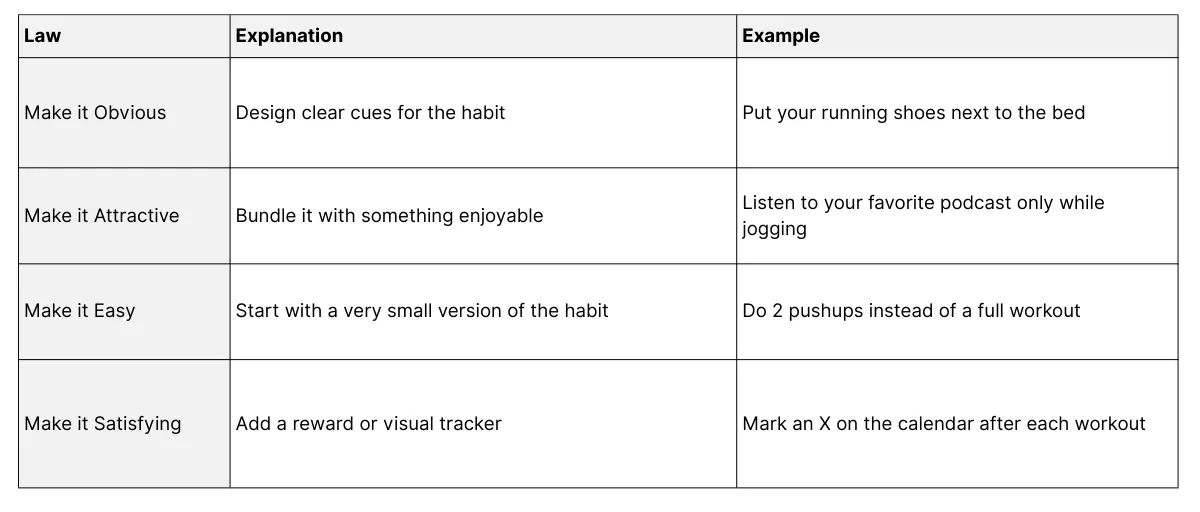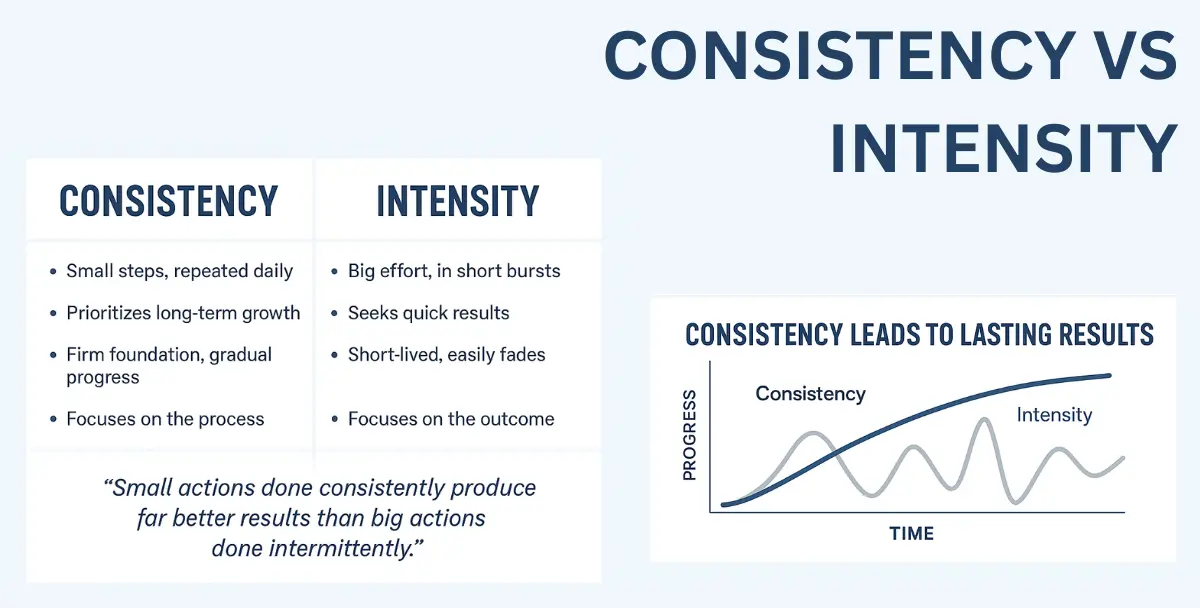Let’s start with a hard truth:
You don’t rise to the level of your goals. You fall to the level of your systems. And your systems? They’re just habits in disguise.
The way you wake up, the way you work, the way you eat, the way you think—it’s all habitual. Most of it happens without your conscious input.
That’s why motivation is overrated. Discipline is overrated. Willpower is overrated.
The only thing that matters is habit. Because habits don’t care if you’re tired. They don’t care if you’re stressed. They don’t care if you “don’t feel like it.”
They just run.
And right now, they’re either carrying you toward success or dragging you toward mediocrity. So the question isn’t “How do I get motivated?”
It’s “How do I rewire my habits so they work for me, not against me?”
How Habits Actually Work
When you consistently do a particular task in a particular circumstance, your subconscious gets trained in doing that. Once the training is complete, your subconscious takes over and starts performing these “tasks” automatically when the same circumstance (trigger) happens. These habits are now created as “shortcuts” to save energy. You no longer have to “think” about how and when to do what activity; your mind automatically takes care of it.
For example: Driving. How careful were you when you drove a car for the first time? How many times have you failed to press the accelerator or brake in time? How many times did the car shut down because of it?
Now you can just drive while talking to your friends without thinking. That is the habit, formed by consistent training of your mind.
Here’s the cycle:
- Cue – A trigger that tells your brain to go into autopilot (e.g., feeling stressed).
- Craving – The desire for a reward (e.g., relief from stress).
- Response – The habit itself (e.g., scrolling social media, smoking, snacking).
- Reward – The satisfaction your brain gets (e.g., dopamine hit from distraction).
Once this loop is reinforced enough, it becomes automatic. You don’t decide—you just do.
That’s why:
- You grab your phone first thing in the morning without thinking.
- You bite your nails when anxious without realizing it.
- You procrastinate even when you know you shouldn’t.
Your conscious mind is no longer in control. Your habits are (through your subconscious).
Why people fail at changing habits (and how to succeed)
As already said, habits are formed through consistently doing a particular task. Most of the habits we have today were formed without conscious effort—we didn’t even realize we were forming them.
Currently, we have good and bad habits. We want to only have good ones that will take us towards success. To achieve this, we must eliminate bad habits and replace them with good ones.
The #1 mistake people make while trying to form a habit is relying on willpower. Willpower is a finite resource, and it drains pretty fast.
You can’t rely on brute force to build good habits. You have to build your mindset and your environment effectively so the behavior or activity of habit becomes automatic.
The 4 Laws of Behavior Change (How to Build Good Habits)
Based on James Clear’s Atomic Habits but stripped of fluff, here’s how to make habits stick:
1. Make it obvious (Cue)
- If you want to read more, leave a book on your pillow.
- If you want to drink more water, put a full bottle on your desk.
- If you want to stop scrolling, delete social media apps from your phone.
Visibility drives action.
2. Make it attractive (Craving)
- Pair a habit you should do with one you want to do (e.g., listen to a podcast only while working out).
- Reframe habits: Instead of “I have to exercise,” say “I get to strengthen my body.”
Your brain pursues what it finds rewarding.
3. Make it easy (Response)
- Reduce friction. Want to run in the morning? Sleep in your workout clothes.
- The Two-Minute Rule: Start with a habit so small it’s impossible to fail (e.g., “Read one page” -> becomes reading daily).
Simplicity beats motivation every time.
4. Make it satisfying (Reward)
- Track progress (checklists, habit trackers).
- Immediate rewards (e.g., a small treat after a workout).
Your brain repeats what it enjoys.

How to Break Bad Habits
Most people try to avoid bad habits like smoking in the hopes that this habit will be removed. It doesn’t work. You can’t just remove a habit that was formed through consistent efforts. You have to replace the bad habit with a good one. This can be done by inverting the laws of habit formation that we discussed above.
The Inversion of the 4 laws
1. Make It Invisible (Remove the Cue)
- If you snack late at night, don’t keep junk food in the house.
- If you waste time on your phone, turn off notifications.
- If you smoke a lot, remove the ashtray, lighter, or matches from your room.
Out of sight, out of mind.
2. Make it unattractive (Kill the Craving)
- Reframe the habit: “Smoking isn’t relieving stress—it’s stealing my breath.”
- Visualize the long-term pain of the habit.
Disgust is a stronger motivator than discipline.
3. Make it difficult (Increase Friction)
- Want to watch less TV? Take the batteries out of the remote.
- Want to stop impulse buying? Unsave your credit card info.
- Want to start saving money? Don’t take your wallet with you every time.
Add steps between you and the habit.
4. Make it unsatisfying (Eliminate the Reward)
- Create a penalty (e.g., donate money every time you skip the gym).
- Public accountability (tell friends you’ll quit).
Immediate consequences beat long-term logic.
The Dark Side of Habits (When Autopilot Destroys You)
Habits aren’t inherently good or bad. They’re efficient. They’re just shortcuts your mind creates to save your mental energy.
That’s why so many people wake up, check their phone, scroll, work, binge Netflix, snack, sleep, and repeat without ever deciding if this is how they want to live.
You are not just your habits. But you are the result of them.
- Tiny bad habits, compounded over the years, lead to regret.
- Tiny good habits, compounded over the years, lead to mastery.
The difference isn’t talent. It’s systems.
Advanced Tactics for Habit Mastery
1. Habit Stacking (Chaining Behaviors | Creating Routines)
- “After I brush my teeth, I’ll meditate for one minute.”
- “After I pour my coffee, I’ll write one sentence of my book.”
Link new habits to existing ones.
2. Environment Design (The Invisible Hand of Behavior)
- If you want to focus, work in a clean space.
- If you want to relax, keep your bedroom screen-free.
You don’t have to resist temptation if you never face it.
3. Identity Shifting (Becoming the type of person who does this)
- Instead of “I’m trying to quit smoking,” say “I’m not a smoker.”
- Instead of “I’m trying to get fit,” say “I’m someone who takes care of my body.”
Always say these things to yourself in the present tense. It may sound like a load of nonsense to you, but this is how your subconscious mind works. Your habits shape your identity, and your identity shapes your habits.
The Ultimate Habit Hack: The 1% Rule
You don’t need massive changes. You need small, consistent ones.
- Improve by 1% daily → 37x better in a year.
- Decline by 1% daily → Near-zero in a year.

The magic (or tragedy) happens in the margins.
Final Truth: Your Habits Are Your Future
You won’t be saved by a single burst of effort. You won’t be ruined by a single mistake. You’ll be defined by what you do daily.
“Intensity may open the door, but only consistency keeps you inside.”
So ask yourself:
- What tiny habit, if I did it every day, would change my life?
- What bad habit, if I stopped it today, would free me?
Then start. Not tomorrow. Now.
Because the best time to plant a tree was 20 years ago. The second-best time is today.
Want More?
Success isn’t an accident. It’s a habit. To achieve success, you need to build relevant habits, and to build habits with discipline, you need to understand and utilize the power of your mind.
If this resonated, subscribe for deep dives on behavior change, productivity, and mastering your mind. No fluff. Just science-backed strategies that work.
Subscribe to Self Development
